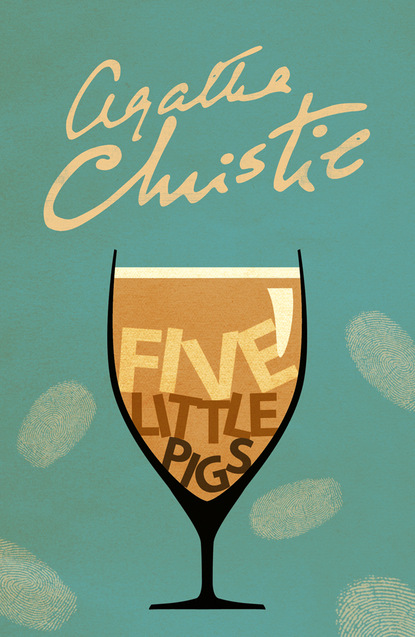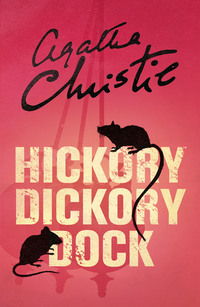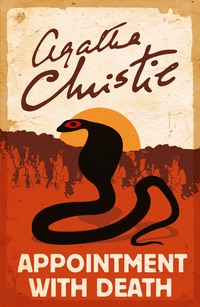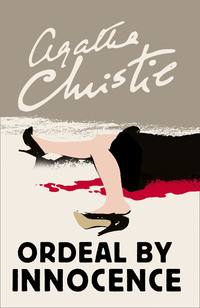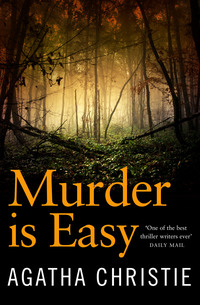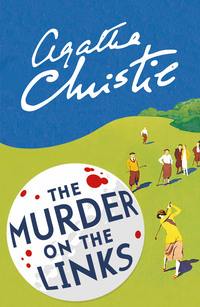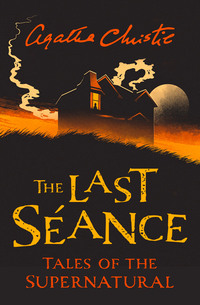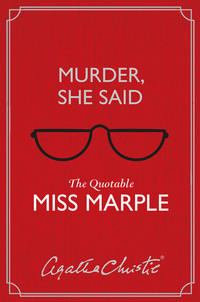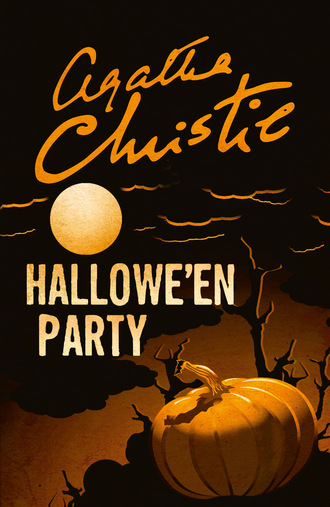
Полная версия
Hallowe’en Party
Supper went off well. Rich iced cakes, savouries, prawns, cheese and nut confections. The eleven-pluses stuffed themselves.
‘And now,’ said Rowena, ‘the last one for the evening. Snapdragon. Across there, through the pantry. That’s right. Now then. Prizes first.’
The prizes were presented, and then there was a wailing, banshee call. The children rushed across the hall back to the dining-room.
The food had been cleared away. A green baize cloth was laid across the table and here was borne a great dish of flaming raisins. Everybody shrieked, rushing forward, snatching the blazing raisins, with cries of ‘Ow, I’m burned! Isn’t it lovely?’ Little by little the Snapdragon flickered and died down. The lights went up. The party was over.
‘It’s been a great success,’ said Rowena.
‘So it should be with all the trouble you’ve taken.’
‘It was lovely,’ said Judith quietly. ‘Lovely.’
‘And now,’ she added ruefully, ‘we’ll have to clear up a bit. We can’t leave everything for those poor women tomorrow morning.’
CHAPTER 3
In a flat in London the telephone bell rang. The owner of the flat, Hercule Poirot, stirred in his chair. Disappointment attacked him. He knew before he answered it what it meant. His friend Solly, with whom he had been going to spend the evening, reviving their never-ending controversy about the real culprit in the Canning Road Municipal Baths murder, was about to say that he could not come. Poirot, who had collected certain bits of evidence in favour of his own somewhat far-fetched theory, was deeply disappointed. He did not think his friend Solly would accept his suggestions, but he had no doubt that when Solly in his turn produced his own fantastic beliefs, he himself, Hercule Poirot, would just as easily be able to demolish them in the name of sanity, logic, order and method. It was annoying, to say the least of it, if Solly did not come this evening. But it is true that when they had met earlier in the day, Solly had been racked with a chesty cough and was in a state of highly infectious catarrh.
‘He had a nasty cold,’ said Hercule Poirot, ‘and no doubt, in spite of the remedies that I have handy here, he would probably have given it to me. It is better that he should not come. Tout de même,’ he added, with a sigh, ‘it will mean that now I shall pass a dull evening.’
Many of the evenings were dull now, Hercule Poirot thought. His mind, magnificent as it was (for he had never doubted that fact) required stimulation from outside sources. He had never been of a philosophic cast of mind. There were times when he almost regretted that he had not taken to the study of theology instead of going into the police force in his early days. The number of angels who could dance on the point of a needle; it would be interesting to feel that that mattered and to argue passionately on the point with one’s colleagues.
His manservant, George, entered the room.
‘It was Mr Solomon Levy, sir.’
‘Ah yes,’ said Hercule Poirot.
‘He very much regrets that he will not be able to join you this evening. He is in bed with a serious bout of ’flu.’
‘He has not got ’flu,’ said Hercule Poirot. ‘He has only a nasty cold. Everyone always thinks they have ’flu. It sounds more important. One gets more sympathy. The trouble with a catarrhal cold is that it is hard to glean the proper amount of sympathetic consideration from one’s friends.’
‘Just as well he isn’t coming here, sir, really,’ said George. ‘Those colds in the head are very infectious. Wouldn’t be good for you to go down with one of those.’
‘It would be extremely tedious,’ Poirot agreed.
The telephone bell rang again.
‘And now who has a cold?’ he demanded. ‘I have not asked anyone else.’
George crossed towards the telephone.
‘I will take the call here,’ said Poirot. ‘I have no doubt that it is nothing of interest. But at any rate—’ he shrugged his shoulders ‘—it will perhaps pass the time. Who knows?’
George said, ‘Very good, sir,’ and left the room.
Poirot stretched out a hand, raised the receiver, thus stilling the clamour of the bell.
‘Hercule Poirot speaks,’ he said, with a certain grandeur of manner designed to impress whoever was at the other end of the line.
‘That’s wonderful,’ said an eager voice. A female voice, slightly impaired with breathlessness. ‘I thought you’d be sure to be out, that you wouldn’t be there.’
‘Why should you think that?’ inquired Poirot.
‘Because I can’t help feeling that nowadays things always happen to frustrate one. You want someone in a terrible hurry, you feel you can’t wait, and you have to wait. I wanted to get hold of you urgently—absolutely urgently.’
‘And who are you?’ asked Hercule Poirot.
The voice, a female one, seemed surprised.
‘Don’t you know?’ it said incredulously.
‘Yes, I know,’ said Hercule Poirot. ‘You are my friend, Ariadne.’
‘And I’m in a terrible state,’ said Ariadne.
‘Yes, yes, I can hear that. Have you also been running? You are very breathless, are you not?’
‘I haven’t exactly been running. It’s emotion. Can I come and see you at once?’
Poirot let a few moments elapse before he answered. His friend, Mrs Oliver, sounded in a highly excitable condition. Whatever was the matter with her, she would no doubt spend a very long time pouring out her grievances, her woes, her frustrations or whatever was ailing her. Once having established herself within Poirot’s sanctum, it might be hard to induce her to go home without a certain amount of impoliteness. The things that excited Mrs Oliver were so numerous and frequently so unexpected that one had to be careful how one embarked upon a discussion of them.
‘Something has upset you?’
‘Yes. Of course I’m upset. I don’t know what to do. I don’t know—oh, I don’t know anything. What I feel is that I’ve got to come and tell you—tell you just what’s happened, for you’re the only person who might know what to do. Who might tell me what I ought to do. So can I come?’
‘But certainly, but certainly. I shall be delighted to receive you.’
The receiver was thrown down heavily at the other end and Poirot summoned George, reflected a few minutes, then ordered lemon barley water, bitter lemon and a glass of brandy for himself.
‘Mrs Oliver will be here in about ten minutes,’ he said.
George withdrew. He returned with the brandy for Poirot, who accepted it with a nod of satisfaction, and George then proceeded to provide the teetotal refreshment that was the only thing likely to appeal to Mrs Oliver. Poirot took a sip of brandy delicately, fortifying himself for the ordeal which was about to descend upon him.
‘It’s a pity,’ he murmured to himself, ‘that she is so scatty. And yet, she has originality of mind. It could be that I am going to enjoy what she is coming to tell me. It could be—’ he reflected a minute ‘—that it may take a great deal of the evening and that it will all be excessively foolish. Eh bien, one must take one’s risks in life.’
A bell sounded. A bell on the outside door of the flat this time. It was not a single pressure of the button. It lasted for a long time with a kind of steady action that was very effective, the sheer making of noise.
‘Assuredly, she has excited herself,’ said Poirot.
He heard George go to the door, open it, and before any decorous announcement could be made the door of his sitting-room opened and Ariadne Oliver charged through it, with George in tow behind her, hanging on to something that looked like a fisherman’s sou’wester and oilskins.
‘What on earth are you wearing?’ said Hercule Poirot.
‘Let George take it from you. It’s very wet.’
‘Of course it’s wet,’ said Mrs Oliver. ‘It’s very wet out. I never thought about water before. It’s a terrible thing to think of.’
Poirot looked at her with interest.
‘Will you have some lemon barley water,’ he said, ‘or could I persuade you to a small glass of eau de vie?’
‘I hate water,’ said Mrs Oliver.
Poirot looked surprised.
‘I hate it. I’ve never thought about it before. What it can do, and everything.’
‘My dear friend,’ said Hercule Poirot, as George extricated her from the flapping folds of watery oilskin. ‘Come and sit down here. Let George finally relieve you of—what is it you are wearing?’
‘I got it in Cornwall,’ said Mrs Oliver. ‘Oilskins. A real, proper fisherman’s oilskin.’
‘Very useful to him, no doubt,’ said Poirot, ‘but not, I think, so suitable for you. Heavy to wear. But come—sit down and tell me.’
‘I don’t know how,’ said Mrs Oliver, sinking into a chair. ‘Sometimes, you know, I can’t feel it’s really true. But it happened. It really happened.’
‘Tell me,’ said Poirot.
‘That’s what I’ve come for. But now I’ve got here, it’s so difficult because I don’t know where to begin.’
‘At the beginning?’ suggested Poirot, ‘or is that too conventional a way of acting?’
‘I don’t know when the beginning was. Not really. It could have been a long time ago, you know.’
‘Calm yourself,’ said Poirot. ‘Gather together the various threads of this matter in your mind and tell me. What is it that has so upset you?’
‘It would have upset you, too,’ said Mrs Oliver. ‘At least, I suppose it would.’ She looked rather doubtful. ‘One doesn’t know, really, what does upset you. You take so many things with a lot of calm.’
‘It is often the best way,’ said Poirot.
‘All right,’ said Mrs Oliver. ‘It began with a party.’
‘Ah yes,’ said Poirot, relieved to have something as ordinary and sane as a party presented to him. ‘A party. You went to a party and something happened.’
‘Do you know what a Hallowe’en party is?’ said Mrs Oliver.
‘I know what Hallowe’en is,’ said Poirot. ‘The 31st of October.’ He twinkled slightly as he said, ‘When witches ride on broomsticks.’
‘There were broomsticks,’ said Mrs Oliver. ‘They gave prizes for them.’
‘Prizes?’
‘Yes, for who brought the best decorated ones.’
Poirot looked at her rather doubtfully. Originally relieved at the mention of a party, he now again felt slightly doubtful. Since he knew that Mrs Oliver did not partake of spirituous liquor, he could not make one of the assumptions that he might have made in any other case.
‘A children’s party,’ said Mrs Oliver. ‘Or rather, an eleven-plus party.’
‘Eleven-plus?’
‘Well, that’s what they used to call it, you know, in schools. I mean they see how bright you are, and if you’re bright enough to pass your eleven-plus, you go on to a grammar school or something. But if you’re not bright enough, you go to something called a Secondary Modern. A silly name. It doesn’t seem to mean anything.’
‘I do not, I confess, really understand what you are talking about,’ said Poirot. They seemed to have got away from parties and entered into the realms of education.
Mrs Oliver took a deep breath and began again.
‘It started really,’ she said, ‘with the apples.’
‘Ah yes,’ said Poirot, ‘it would. It always might with you, mightn’t it?’
He was thinking to himself of a small car on a hill and a large woman getting out of it, and a bag of apples breaking, and the apples running and cascading down the hill.
‘Yes,’ he said encouragingly, ‘apples.’
‘Bobbing for apples,’ said Mrs Oliver. ‘That’s one of the things you do at a Hallowe’en party.’
‘Ah yes, I think I have heard of that, yes.’
‘You see, all sorts of things were being done. There was bobbing for apples, and cutting sixpence off a tumblerful of flour, and looking in a looking-glass—’
‘To see your true love’s face?’ suggested Poirot knowledgeably.
‘Ah,’ said Mrs Oliver, ‘you’re beginning to understand at last.’
‘A lot of old folklore, in fact,’ said Poirot, ‘and this all took place at your party.’
‘Yes, it was all a great success. It finished up with Snapdragon. You know, burning raisins in a great dish. I suppose—’ her voice faltered, ‘—I suppose that must be the actual time when it was done.’
‘When what was done?’
‘A murder. After the Snapdragon everyone went home,’ said Mrs Oliver. ‘That, you see, was when they couldn’t find her.’
‘Find whom?’
‘A girl. A girl called Joyce. Everyone called her name and looked around and asked if she’d gone home with anyone else, and her mother got rather annoyed and said that Joyce must have felt tired or ill or something and gone off by herself, and that it was very thoughtless of her not to leave word. All the sort of things that mothers say when things like that happen. But anyway, we couldn’t find Joyce.’
‘And had she gone home by herself?’
‘No,’ said Mrs Oliver, ‘she hadn’t gone home…’ Her voice faltered. ‘We found her in the end—in the library. That’s where—where someone did it, you know. Bobbing for apples. The bucket was there. A big, galvanized bucket. They wouldn’t have the plastic one. Perhaps if they’d had the plastic one it wouldn’t have happened. It wouldn’t have been heavy enough. It might have tipped over—’
‘What happened?’ said Poirot. His voice was sharp.
‘That’s where she was found,’ said Mrs Oliver. ‘Someone, you know, someone had shoved her head down into the water with the apples. Shoved her down and held her there so that she was dead, of course. Drowned. Drowned. Just in a galvanized iron bucket nearly full of water. Kneeling there, sticking her head down to bob at an apple. I hate apples,’ said Mrs Oliver. ‘I never want to see an apple again.’
Poirot looked at her. He stretched out a hand and filled a small glass with cognac.
‘Drink this,’ he said. ‘It will do you good.’
CHAPTER 4
Mrs Oliver put down the glass and wiped her lips.
‘You were right,’ she said. ‘That—that helped. I was getting hysterical.’
‘You have had a great shock, I see now. When did this happen?’
‘Last night. Was it only last night? Yes, yes, of course.’
‘And you came to me.’
It was not a quite a question, but it displayed a desire for more information than Poirot had yet had.
‘You came to me—why?’
‘I thought you could help,’ said Mrs Oliver. ‘You see, it’s—it’s not simple.’
‘It could be and it could not,’ said Poirot. ‘A lot depends. You must tell me more, you know. The police, I presume, are in charge. A doctor was, no doubt, called. What did he say?’
‘There’s to be an inquest,’ said Mrs Oliver.
‘Naturally.’
‘Tomorrow or the next day.’
‘This girl, Joyce, how old was she?’
‘I don’t know exactly. I should think perhaps twelve or thirteen.’
‘Small for her age?’
‘No, no, I should think rather mature, perhaps. Lumpy,’ said Mrs Oliver.
‘Well developed? You mean sexy-looking?’
‘Yes, that is what I mean. But I don’t think that was the kind of crime it was—I mean that would have been more simple, wouldn’t it?’
‘It is the kind of crime,’ said Poirot, ‘of which one reads every day in the paper. A girl who is attacked, a school child who is assaulted—yes, every day. This happened in a private house which makes it different, but perhaps not so different as all that. But all the same, I’m not sure yet that you’ve told me everything.’
‘No, I don’t suppose I have,’ said Mrs Oliver. ‘I haven’t told you the reason, I mean, why I came to you.’
‘You knew this Joyce, you knew her well?’
‘I didn’t know her at all. I’d better explain to you, I think, just how I came to be there.’
‘There is where?’
‘Oh, a place called Woodleigh Common.’
‘Woodleigh Common,’ said Poirot thoughtfully. ‘Now where lately—’ he broke off.
‘It’s not very far from London. About—oh, thirty to forty miles, I think. It’s near Medchester. It’s one of those places where there are a few nice houses, but where a certain amount of new building has been done. Residential. A good school nearby, and people can commute from there to London or into Medchester. It’s quite an ordinary sort of place where people with what you might call everyday reasonable incomes live.’
‘Woodleigh Common,’ said Poirot again, thoughtfully.
‘I was staying with a friend there. Judith Butler. She’s a widow. I went on a Hellenic cruise this year and Judith was on the cruise and we became friends. She’s got a daughter. A girl called Miranda who is twelve or thirteen. Anyway, she asked me to come and stay and she said friends of hers were giving this party for children, and it was to be a Hallowe’en party. She said perhaps I had some interesting ideas.’
‘Ah,’ said Poirot, ‘she did not suggest this time that you should arrange a murder hunt or anything of that kind?’
‘Good gracious, no,’ said Mrs Oliver. ‘Do you think I should ever consider such a thing again?’
‘I should think it unlikely.’
‘But it happened, that’s what’s so awful,’ said Mrs Oliver. ‘I mean, it couldn’t have happened just because I was there, could it?’
‘I do not think so. At least—Did any of the people at the party know who you were?’
‘Yes,’ said Mrs Oliver. ‘One of the children said something about my writing books and that they liked murders. That’s how it—well—that’s what led to the thing—I mean to the thing that made me come to you.’
‘Which you still haven’t told me.’
‘Well, you see, at first I didn’t think of it. Not straight away. I mean, children do queer things sometimes. I mean there are queer children about, children who—well, once I suppose they would have been in mental homes and things, but they send them home now and tell them to lead ordinary lives or something, and then they go and do something like this.’
‘There were some young adolescents there?’
‘There were two boys, or youths as they always seem to call them in police reports. About sixteen to eighteen.’
‘I suppose one of them might have done it. Is that what the police think?’
‘They don’t say what they think,’ said Mrs Oliver, ‘but they looked as though they might think so.’
‘Was this Joyce an attractive girl?’
‘I don’t think so,’ said Mrs Oliver. ‘You mean attractive to boys, do you?’
‘No,’ said Poirot, ‘I think I meant—well, just the plain simple meaning of the word.’
‘I don’t think she was a very nice girl,’ said Mrs Oliver, ‘not one you’d want to talk to much. She was the sort of girl who shows off and boasts. It’s a rather tiresome age, I think. It sounds unkind what I’m saying, but—’
‘It is not unkind in murder to say what the victim was like,’ said Poirot. ‘It is very, very necessary. The personality of the victim is the cause of many a murder. How many people were there in the house at the time?’
‘You mean for the party and so on? Well, I suppose there were five or six women, some mothers, a school-teacher, a doctor’s wife, or sister, I think, a couple of middle-aged married people, the two boys of sixteen to eighteen, a girl of fifteen, two or three of eleven or twelve—well that sort of thing. About twenty-five or thirty in all, perhaps.’
‘Any strangers?’
‘They all knew each other, I think. Some better than others. I think the girls were mostly in the same school. There were a couple of women who had come in to help with the food and the supper and things like that. When the party ended, most of the mothers went home with their children. I stayed behind with Judith and a couple of others to help Rowena Drake, the woman who gave the party, to clear up a bit, so the cleaning women who came in the morning wouldn’t have so much mess to deal with. You know, there was a lot of flour about, and paper caps out of crackers and different things. So we swept up a bit, and we got to the library last of all. And that’s when—when we found her. And then I remembered what she’d said.’
‘What who had said?’
‘Joyce.’
‘What did she say? We are coming to it now, are we not? We are coming to the reason why you are here?’
‘Yes. I thought it wouldn’t mean anything to—oh, to a doctor or the police or anyone, but I thought it might mean something to you.’
‘Eh bien,’ said Poirot, ‘tell me. Was this something Joyce said at the party?’
‘No—earlier in the day. That afternoon when we were fixing things up. It was after they’d talked about my writing murder stories and Joyce said “I saw a murder once” and her mother or somebody said “Don’t be silly, Joyce, saying things like that” and one of the older girls said “You’re just making it up” and Joyce said “I did. I saw it I tell you. I did. I saw someone do a murder,” but no one believed her. They just laughed and she got very angry.’
‘Did you believe her?’
‘No, of course not.’
‘I see,’ said Poirot, ‘yes, I see.’ He was silent for some moments, tapping a finger on the table. Then he said:
‘I wonder—she gave no details—no names?’
‘No. She went on boasting and shouting a bit and being angry because most of the other girls were laughing at her. The mothers, I think, and the older people, were rather cross with her. But the girls and the younger boys just laughed at her! They said things like “Go on, Joyce, when was this? Why did you never tell us about it?” And Joyce said, “I’d forgotten all about it, it was so long ago”.’
‘Aha! Did she say how long ago?’
‘Years ago,’ she said. ‘You know, in rather a would-be grown-up way.’
‘“Why didn’t you go and tell the police then?” one of the girls said. Ann, I think, or Beatrice. Rather a smug, superior girl.’
‘Aha, and what did she say to that?’
‘She said: “Because I didn’t know at the time it was a murder”.’
‘A very interesting remark,’ said Poirot, sitting up rather straighter in his chair.
‘She’d got a bit mixed up by then, I think,’ said Mrs Oliver. ‘You know, trying to explain herself and getting angry because they were all teasing her.
‘They kept asking her why she hadn’t gone to the police, and she kept on saying “Because I didn’t know then that it was a murder. It wasn’t until afterwards that it came to me quite suddenly that that was what I had seen”.’
‘But nobody showed any signs of believing her—and you yourself did not believe her—but when you came across her dead you suddenly felt that she might have been speaking the truth?’
‘Yes, just that. I didn’t know what I ought to do, or what I could do. But then, later, I thought of you.’
Poirot bowed his head gravely in acknowledgement. He was silent for a moment or two, then he said:
‘I must pose to you a serious question, and reflect before you answer it. Do you think that this girl had really seen a murder? Or do you think that she merely believed that she had seen a murder?’
‘The first, I think,’ said Mrs Oliver. ‘I didn’t at the time. I just thought that she was vaguely remembering something she had once seen and was working it up to make it sound important and exciting. She became very vehement, saying, “I did see it, I tell you. I did see it happen”.’
‘And so.’
‘And so I’ve come along to you,’ said Mrs Oliver, ‘because the only way her death makes sense is that there really was a murder and that she was a witness to it.’
‘That would involve certain things. It would involve that one of the people who were at the party committed the murder, and that that same person must also have been there earlier that day and have heard what Joyce said.’
‘You don’t think I’m just imagining things, do you?’ said Mrs Oliver. ‘Do you think that it is all just my very far-fetched imagination?’
‘A girl was murdered,’ said Poirot. ‘Murdered by someone who had strength enough to hold her head down in a bucket of water. An ugly murder and a murder that was committed with what we might call, no time to lose. Somebody was threatened, and whoever it was struck as soon as it was humanly possible.’






